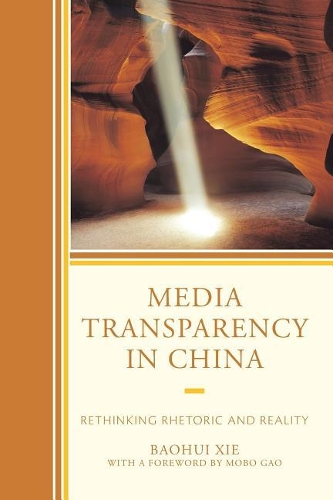
Media Transparency in China: Rethinking Rhetoric and Reality
(Paperback)
Available Formats
Publishing Details
Media Transparency in China: Rethinking Rhetoric and Reality
By (Author) Baohui Xie
Foreword by Mobo Gao
Bloomsbury Publishing PLC
Lexington Books
24th March 2017
United States
Classifications
Professional and Scholarly
Non Fiction
Political control and freedoms
302.230951
Physical Properties
Paperback
218
Width 149mm, Height 231mm, Spine 16mm
327g
Description
This book argues that the gap between the official transparency rhetoric and the censorship reality has demonstrated the discrepancy between what the Party is and what it claims to be. Such a discrepancy is manifested by the reality that the reformed news industry, a hybrid of market-oriented commercialization and party-state control, has largely failed to deliver either the voice of the disenfranchised groups or the value of journalism. To observe the discrepancy, this book investigates the role of transparency in the Chinese news media. Media transparency, which goes beyond the issue of censorship and press freedom, has been undermined by the consensus reached between the party-state and the media on political and market control. It is this mutually accommodating and benefiting scheme between power and profits that has been hollowing out the substance of the transparency rhetoric and distorting the Marxist idea of press freedom as freedom for all. This book argues that the cause of such a gap between rhetoric and reality is rooted in the disjuncture of political representation of both the party-state and the profit-seeking media.
Reviews
This book is more than a study of contemporary Chinese media and should be of interest to anyone who cares about the general social and political developments of the country. The author goes beyond the usual discussion of censorship and authoritarianism. With revealing evidence and a careful examination of the working structure of the Chinese media, he argues convincingly that a discrepancy between reality and the Party/state's claim and a consequential 'disjuncture of political representation,' rather than 'media transparency,' should be the issue. -- Zhang Shaoquan, Jiangxi Normal University
Why has the media boom in post-Mao China failed to lead to adequate media transparency Why is censorship denied by both the Party-state and the mass media What has resulted in the rampant media corruption hampering transparency These are the main questions that Baohui Xie raises in this rich, engaging, and thought-provoking volume. The book makes a very important contribution to the effort to find a new framework for analyzing press freedom, or the lack of it, in the Peoples Republic of China. It shifts the discussion away from individual freedom and assumptions of a state-versus-market dichotomy towards the substance of media transparency and supervision by public opinion. Instead of rejecting press freedom as a desirable value, it questions the liberal market logic that simplistically attributes the lack of freedom to censorship and control by the Party-state. Xie argues vigorously and elegantly about the complicity of the Party-state and the media in jointly suppressing the voice of the disfranchised, especially the poor and disadvantaged social groups. Whether one agrees with Xies argument or not, there can be no doubt that the book has the power to make one look at Chinas mass media, state control, and a broad range of media issues differently. The book is remarkable in its unity and conceptual clarity. It will be of great value to scholars and students of Chinas mediascape and media politics. A must-read of anyone attempting to understand the Chinese medias adaptive strategies as they are caught between the state and market as well as the trajectories of change in statemedia and marketmedia relations. -- Yingjie Guo, University of Sydney
Author Bio
Baohui Xie lectures at the Centre for Asian Studies at the University of Adelaide and is associate professor at Jiangxi Normal University.
